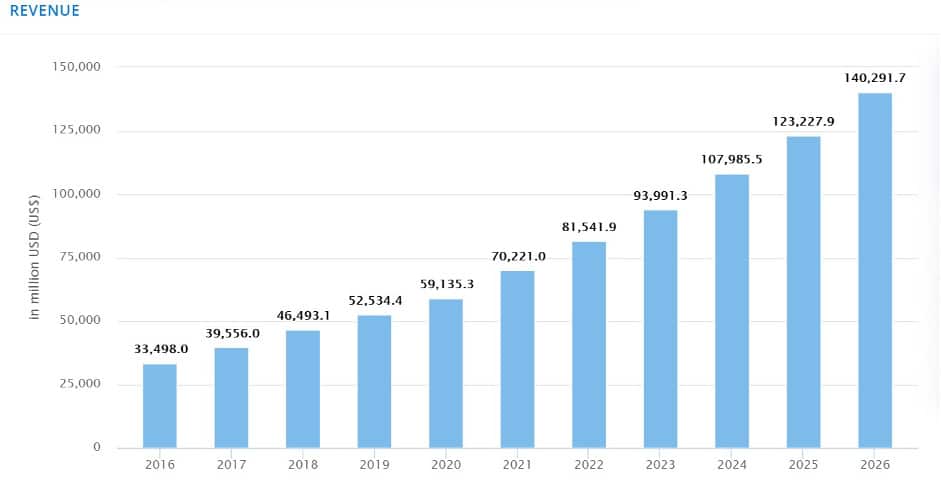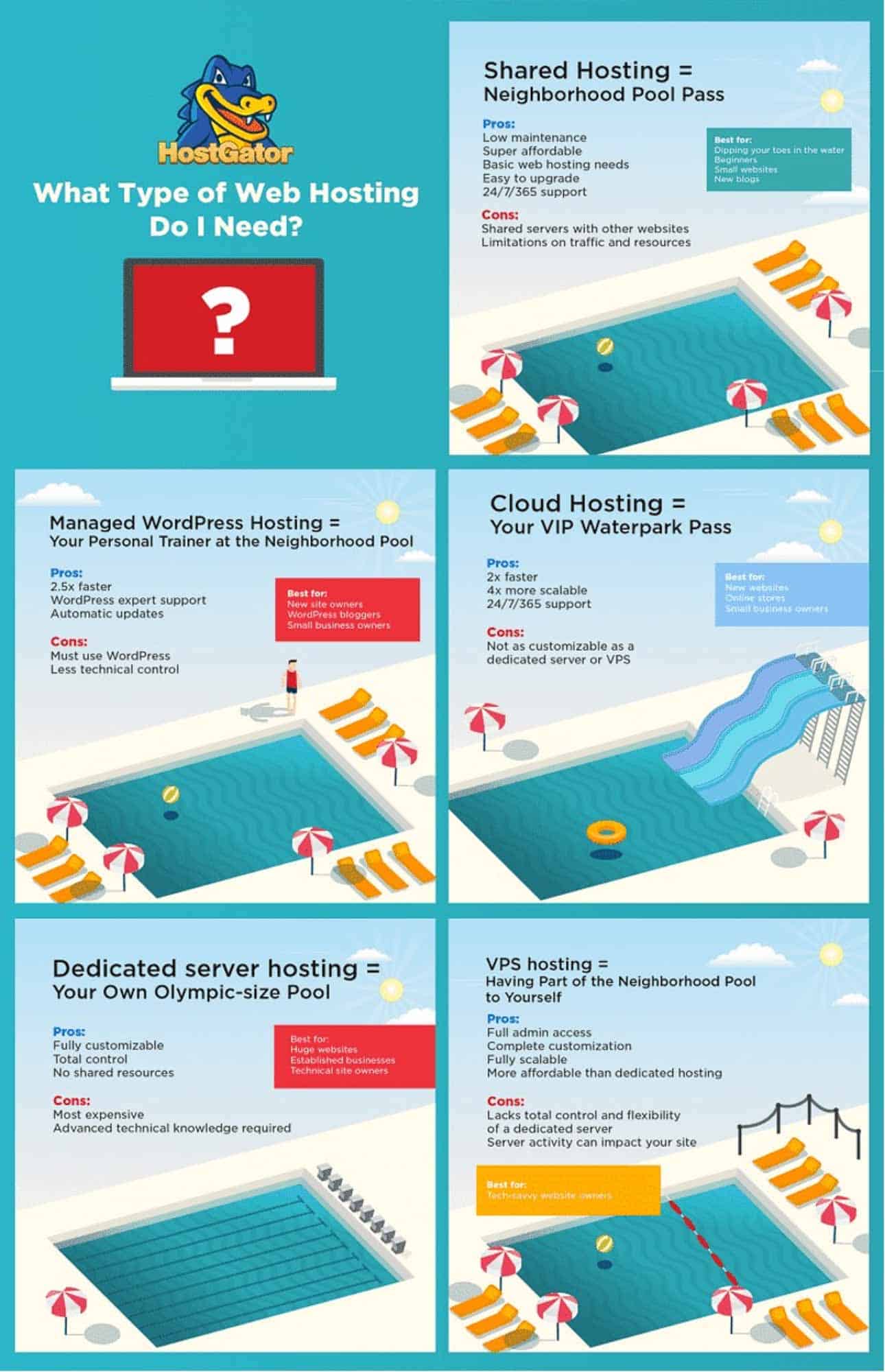If you are about to create a niche website or blog, I am pretty sure by now you are struggling with hosting, right?
Because let’s face it- Choosing the right web hosting is probably one of the most critical steps you need to take in the early phases of your business. But the real problem comes when there are so many options that you don’t even know where to start. Or even which one is right for you.
So, how to choose the right web hosting for your website?
In this post, I will explain the different web hosting options and my personal recommendations for each of them.
Let’s dive in!
*Disclosure: I only recommend products I would use myself, and all opinions expressed here are my own. This post may contain affiliate links that at no additional cost to you, I may earn a small commission.
Web Hosting: The Foundation of Your Blog.
Web hosting is a service provided by a web host with the necessary technologies and infrastructure to access your blog on the Internet.
Just like storing your items at home and accessing them anytime you want, you can think of web hosting along the same line. Instead of storing your household goods, you’re now holding the files needed to get your blog up and running on physical servers.

Understanding Blogs.

Generally speaking, there are two types of blogs, namely personal and business. The former is more flexible, carefree, and incredibly dynamic. A personal blog can serve as an excellent platform to introduce yourself, compile, and share your thoughts.
On the other hand, a business blog focuses on helping the business develop an identity and create brand recognition. This tactic helps to enhance visibility to the customers and grow the business.
Once your blog is up and running, you need to focus on the ways to drive traffic to your blog. When your blog develops a dedicated audience, it can be highly beneficial. Remember that website traffic are potential new customers. As such, popular blogs can be monetized and serve as an additional source of income.
Why Do You Need Web Hosting?

If you want a digital presence, you require a web hosting service.
So, if you want to build a blog (or website), first you’ll need a trusted and reliable web hosting solution so that people can access your blog online. When you sign up for a hosting plan, you’re typically buying real estate for your blog in one of the data center servers.
How to Choose the right Web Hosting for Your Blog.

Your blog content is ready, and the next thing is to source for web hosting for your blog so that users can view, access, and directly interact with your content online. Identifying the right web hosting for your blog can be overwhelming as there are so many web hosts with various plans and features that all appear pretty similar.
Fret not, that’s why we’re here. Like in anything you set out to do, you need to have a plan in place. The same applies to choosing a web hosting solution for your blog. First, you need to know what you hope to achieve for your blog and its plans.
Then, check out the following tips to learn how to choose the right web hosting for your website so you can make a well-informed decision:
Unless you never update the content in your blog, don’t opt for free web hosting. Free web hosting gives you minimal flexibility, and you won’t have much control at all. In addition, the resources offered are generally minimal.
Once you add in restrictions and possibly forced branding by the free web hosting service provider, things look bleak indeed. So, don’t use free web hosting – especially if you’re running a business blog.
Server uptime is the amount of time a server is up and running fine. You’d want your blog to be up and fully functional at all times; if possible, you never want to have any downtime for your blog. If your blog is down most of the time, you’ll register a high bounce rate and lose your audience in no time.
Hence, when you shop around, look for one that guarantees a high uptime – 99.9% is good. So, look at uptime scores; this will give you a good indication of the hosting provider’s reliability.
When it comes to the Internet, speed is everything. Nobody is going to hang around, waiting patiently for your page to load; they’ll immediately leave, and your blog’s bounce rate will shoot up. You don’t want this. Also, a slow-loading blog doesn’t rank high in Google’s ranking, and you won’t get the visibility you want.
As such, never compromise the speed of your blog and choose a web host that can give you the blazing speeds you expect. However, your blog may be slow due to poor optimization at your end, so you may want to investigate further. That said, the problem may still be that your web host’s performance isn’t up to par.
Ultimately, you’d want to give your users the best possible experience, so choose a web host that ensures your blog is high-performing so that you can rank high in Google’s Search Engine Results Pages (SERPs) and quickly grow your audience.
If you’re just starting on your blog, chances are, you’ll only require a decent web hosting solution with not much horsepower. Understandably, cost becomes a key factor when looking for a blogging hosting solution because you may not be making much money at first.
That said, this doesn’t mean you need to settle for subpar service.
Once you shop around, you’ll be surprised at the quality you can get for a reasonably low price; you don’t have to burn a hole in your pocket to afford quality blog hosting.
Knowing the location of the server is essential. Data takes time to travel distances, so having a server close to your potential visitors will reduce page load times. For example, if your target market is in the USA, you can opt for a server at that location for better performance.
Bear in mind that the farther your hosting servers are from your visitors, the longer your blog will take to appear at their end. So, make sure you go for a web host whose hosting servers are close to your visitors.
You need to remember that things change and can be dynamic. The same applies to your blog, be it for personal or business purposes. As the traffic increases over time and more content gets added, you’ll need to consider if existing resources are sufficient.
Also, you’d want to know whether it would be easy to scale up or down in the future. Ideally, consider a web host or plan that allows some flexibility in hosting plan options. This consideration may affect your future with the web host.
Even the experts may at times need help. Having a good blog hosting provider with the quality support you need can significantly help your whole web hosting journey. As such, explore the various levels of support on the table and make sure you’re comfortable with what is on offer.
Most offer 24/7 support, with some even offering 24/7/365 support; this is especially important for those who plan to engage an overseas provider due to the time difference. Take note that quality support is generally a good indication of a good and trusted web host.
Types of Web Hosting Plans

Web hosts usually offer various options, from the cheapest web hosting options to the most expensive and complex.
These packages cater to different needs. The cheaper ones typically come with more simplified features, and the pricier plans tend to provide a broader range of advanced features. Also, the division of server resources allocated on a server to your blog depends on the type of hosting you choose.
A blog usually does not require heavy-duty resources. However, as traffic grows and your audience grows significantly, you may need to reassess the situation. To make a better decision, you’ll have to understand the various types of web hosting available:
Shared hosting is the most popular option since it is cheap and easily affordable. This is because the resources on a server are shared among the many websites residing on the same server. Hence, if a site suddenly faces a surge in traffic, that site will be needing more resources, leaving the others with less.
Additionally, since everyone is sharing everything, you don’t have absolute control, and security could be a concern. Therefore, shared hosting is recommended for smaller sites or blogs (personal blogs) with lesser security needs.
Managed WordPress hosting means that the hosting provider handles all the basic hosting administrative tasks, such as installing WordPress, automating daily backups, WordPress core updates, and server-level caching.
Managed hosting providers usually also help you in getting a leg up on their service. When you purchase a hosting package from a provider, they will walk you through the process of integrating your website on their servers.
So if you are planning on spending most of your time on WordPress, this might be one of the best solutions for you.
A common and popular alternative to shared hosting is Virtual Private Server (VPS) hosting. It’s a step up from shared hosting in several ways. VPS resides within a parent server that uses virtualization technology to create partitions. Each of these partitions is a distinct VPS.
Because of this partitioning, VPS each get dedicated resources, including CPU clock cycles and memory. The full-time allocation of resources makes VPS plans much more reliable and better performing than shared hosting.
In addition, VPS hosting is highly scalable, so you can constantly increase resources as required. However, all of this comes at a cost. Not only is VPS more expensive than shared hosting, but it can be complex to manage without the necessary technical skills.
Considered the mammoth of web hosting, dedicated hosting is the priciest, and this is when you get a whole server with all its resources for yourself. Hence, you have absolute control over the entire server. This type of hosting is perfect for huge businesses that consistently expect very high traffic.
In cloud hosting, multiple machines are interconnected to function as one large entity. These resources are then shared to create a much larger server. The space can then be partitioned out, similarly to VPS.
While Cloud hosting behaves almost identically to VPS, the scalability factor is much more significant. Thanks to the multiple interlinked servers, reliability is also potentially much higher compared to VPS.
You might want to read next:
How to choose the right web hosting- Conclusion
Since you’ve invested much time and effort into your niche blog, it makes sense to spend time looking into getting the best web hosting to launch your blog into the Internet space. Remember, your eventual choice of web hosting for your blog can make a world of difference to its success.
Choose wisely, as good web hosting can save you lots of hassles and headaches in the long run. If you are working with WordPress managed Wordpress hosting might be your option, however, if you are focused on providing top speed and performance, VPS or Cloud hosting will work better.
What is your web hosting choice?
Leave a comment below with your answer


RELATED CONTENT





